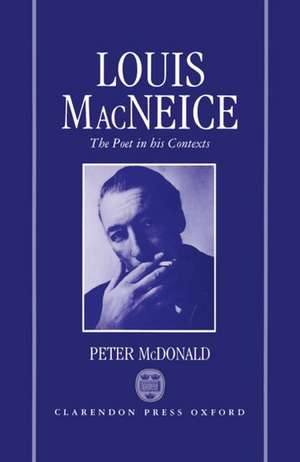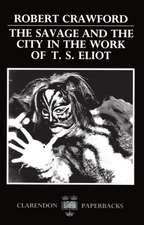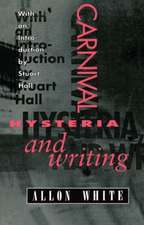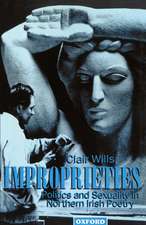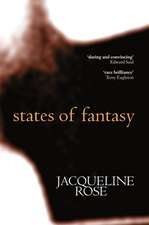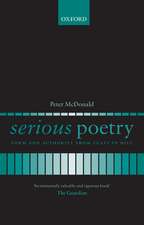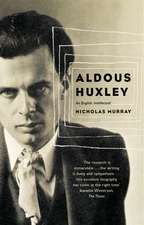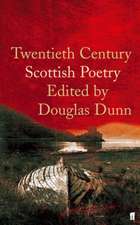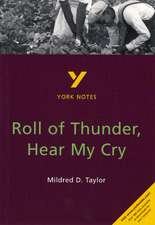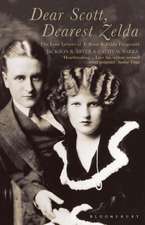Louis MacNeice: The Poet in his Contexts
Autor Peter McDonalden Limba Engleză Hardback – 25 apr 1991
Preț: 757.73 lei
Preț vechi: 1531.27 lei
-51% Nou
Puncte Express: 1137
Preț estimativ în valută:
145.08€ • 148.82$ • 122.15£
145.08€ • 148.82$ • 122.15£
Carte tipărită la comandă
Livrare economică 15-21 februarie
Preluare comenzi: 021 569.72.76
Specificații
ISBN-13: 9780198117667
ISBN-10: 0198117663
Pagini: 252
Dimensiuni: 144 x 223 x 20 mm
Greutate: 0.44 kg
Editura: Clarendon Press
Colecția Clarendon Press
Locul publicării:Oxford, United Kingdom
ISBN-10: 0198117663
Pagini: 252
Dimensiuni: 144 x 223 x 20 mm
Greutate: 0.44 kg
Editura: Clarendon Press
Colecția Clarendon Press
Locul publicării:Oxford, United Kingdom
Recenzii
`excellent book ... McDonald backs up any polemical thrust, or his own agenda, with a thorough scrutiny of the shifting relation between MacNeice's aesthetic and its historical environment.'Edna Longley, Irish Times
'A well-written book that sticks to its subject. Excellent bibliography and useful index. Recommended for graduate students and upper-level undergraduates ... a fine study and deserves to be in strong collections.'W.J. Martz, Ripon College, CHOICE, Feb '92
'This excellent, jargon-free study establishes that MacNeice's themes of 'the problematic understanding of the self, time's subversion of history and the individual' are significant philosophically, existentially, artistically and politically.'Angus Calder, Open University, The W.H. Auden Society Newsletter, No. 8, December 1991
'Peter McDonald;s book begins with an admirably lucid disentangling of canonical traditions.'Bernard O'Donoghue, Magdalen College, Essays in Criticism, Vol. XLII, April 1993, No. 2
'The value of this study lies in McDonald's tenacious following of MacNeice's themes to make a much more coherent body of work than is generally perceived, while never sacrificing coherence to false consistency.'Robyn Marsack, MLR, 8.2, 1993
'Through careful, impressively detailed reconstructions of the literary and political climates of the early and late 1930s, the war years, and the post-war period in Britain, he convincingly rescues MacNeice from the conventional critical estimates of his work ... When ... as in his study of the remarkable late poems, McDonald gets down to sustained analyses of those poems he unreservedly admires in their own complex right, as it were, he establishes himself as one of MacNeice's most astute critics.'Terence Brown, University of Dublin, Review of English Studies, Vol. 44, No. 176, Nov '93
'A well-written book that sticks to its subject. Excellent bibliography and useful index. Recommended for graduate students and upper-level undergraduates ... a fine study and deserves to be in strong collections.'W.J. Martz, Ripon College, CHOICE, Feb '92
'This excellent, jargon-free study establishes that MacNeice's themes of 'the problematic understanding of the self, time's subversion of history and the individual' are significant philosophically, existentially, artistically and politically.'Angus Calder, Open University, The W.H. Auden Society Newsletter, No. 8, December 1991
'Peter McDonald;s book begins with an admirably lucid disentangling of canonical traditions.'Bernard O'Donoghue, Magdalen College, Essays in Criticism, Vol. XLII, April 1993, No. 2
'The value of this study lies in McDonald's tenacious following of MacNeice's themes to make a much more coherent body of work than is generally perceived, while never sacrificing coherence to false consistency.'Robyn Marsack, MLR, 8.2, 1993
'Through careful, impressively detailed reconstructions of the literary and political climates of the early and late 1930s, the war years, and the post-war period in Britain, he convincingly rescues MacNeice from the conventional critical estimates of his work ... When ... as in his study of the remarkable late poems, McDonald gets down to sustained analyses of those poems he unreservedly admires in their own complex right, as it were, he establishes himself as one of MacNeice's most astute critics.'Terence Brown, University of Dublin, Review of English Studies, Vol. 44, No. 176, Nov '93
